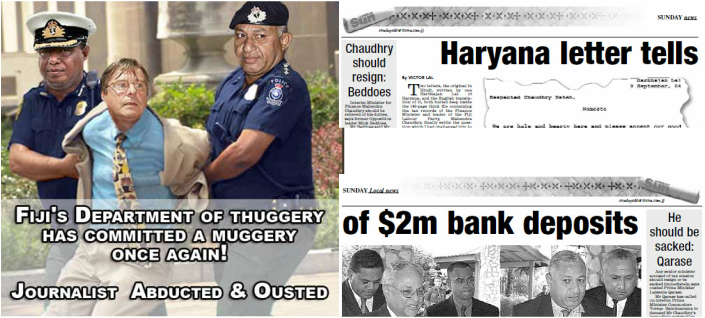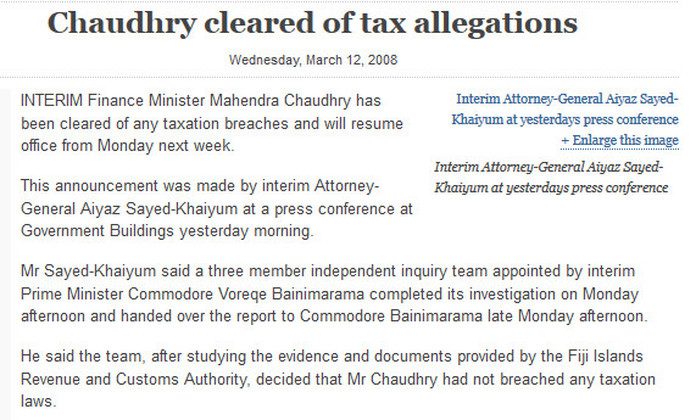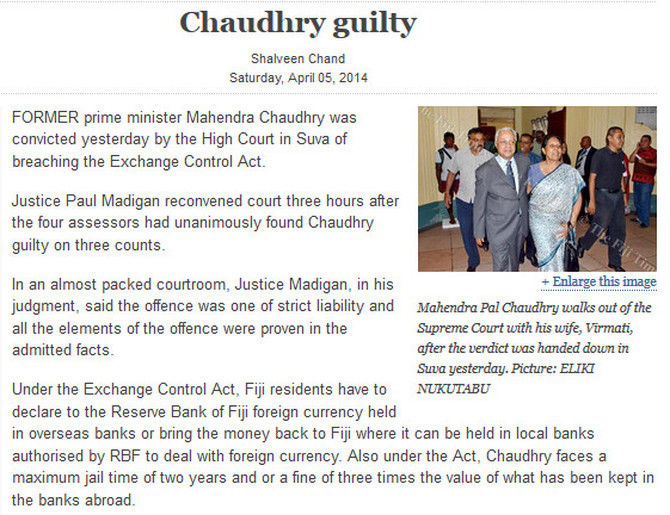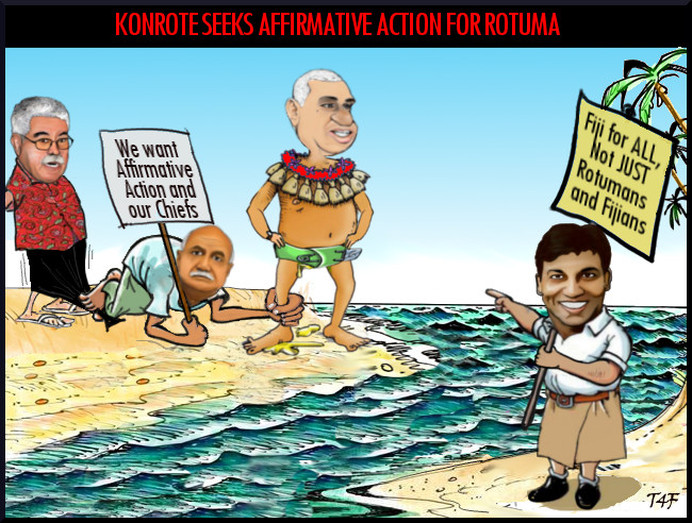Khaiyum told UNHRC that the media "played a pivotal and negative role" in Fiji's "historical past of racism, and religious prejudice" which cannot be allowed to happen again. To this end, he says government is working with the media through the Media Industry Development Authority (MIDA), "to encourage the media to work towards a development model of media freedom - one in which the media plays an important part in building a just and equal society."; We challenge Khaiyum's lies, for until he brought in draconian media decree [to ensure Fiji First party election win], the press was in the forefront of challenging racism and religious prejudice without fear or favour; in fact one his Interim Ministers (Finance) Mahendra Chaudhry had exploited the scourge of RACISM to become millionaire overnight, hiding $2million in secret Australian bank account - and when Victor Lal, through the Fiji Sun, exposed it - what did Khaiyum and Bainimarama do - they defended Chaudhry and deported the paper's publisher Russell Hunter out of Fiji; another Minister (Inoke Kubuabola) has built his political career on RACISM; We also say that we cannot rely on the present Fiji Sun to lead the way in Investigative Journalism, for they have tied themselves to the sulu and dhoti of Khaiyum and Bainimarama's government; in fact, they have SMOTHERED the Role of Investigative Journalism in Fiji! We will never encourage anyway (whistle-blowers) to go to Fiji Sun, for they will give you a cup of tea, keep you engaged in conversation, while one of them will phone the military to take you up to the camp - remember its a shameless pro-regime propaganda rag sheet since 2008!
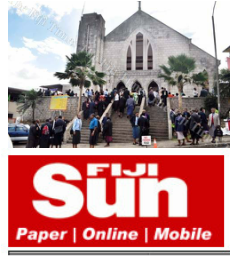
Chiefs, Church, and Coup Culture
The “Tagi ni Taukei” mantra the root of all evil in Fiji
By VICTOR LAL
Fiji Sun, 13 May 2007
“Sit down everybody, sit down. This is a takeover. We apologise for any inconvenience caused. You are requested to stay cool, stay down, sit down and listen to what we are going to tell you. Please stay calm, ladies and gentlemen,” announced a man cowardly hiding behind a mask. Another man who was sitting down quietly in the public gallery soon joined the masked man: “Mr Prime Minister, please lead your team down and remain calm. Mr Prime Minister, Sir, will you lead your team down to the right…”
One Captain X, and a 38-year-old Lieutenant-Colonel Sitiveni Rabuka, twenty years ago, at 10am on 14 May 1987, spoke these treasonous words as a “hit squad” of ten soldiers toppled Dr Timoci Bavadra’s NFP/FLP Coalition government in the first military coup in the South Pacific. As the parliamentarians were being detained, one Cabinet minister Dr Tupeni Baba, related to Rabuka, naively but defiantly, shouted, “What kind of a joke is this?” What was being played out in Parliament was no joking game; it was part of a fulfilment of an obnoxious prayer, “The Tagi ni Taukei – Cry of the Taukei”, that had been earlier recited in the home of Methodist Church minister (once the head of the Methodist Dilkusha Indian Circuit), Reverend Tomasi Raikivi, a cousin of Rabuka’s: “Save us, and save our land. You saved the Israelites, when foreigners took their land from them. Dear God, please answer our prayer and do the same for us. Amen”. Although the prayer ended with “Amen”, what should have been intoned was “Amin” – for the plan was to hunt and hound out fellow Indo-Fijians like Idi Amin did in Uganda.
The other so-called “Man of God” beseeching his Heavenly Lord for guidance was Ratu Inoke Kubuabola, a cousin of the late President Ratu Sir Penaia Ganilau. Kubuabola was President of the Fiji Council of Churches and Secretary General of the Bible Society of the South Pacific. It was Kubuabola, who had first termed the extreme Fijian nationalist organization that had sprung up following Dr Bavadra’s election victory as the Taukei Movement, and he was its direct link with Mr Rabuka leading up to the coup.
The two men of the robe were not alone. At the prayer meeting were others, who would later carve out respectable standing and careers from the debris of the 1987 coups: Ratu Finau Mara, the son of the late President Ratu Sir Kamisese Mara; Ratu George Kadavulevu, son of the Paramount Chief of Fiji, the late Ratu George Cakobau; Ratu Keni Viuyasawa, the brother of Brigadier Ratu Epeli Nailatikau; Daniel Veitata, Apisai Tora, the late Jone Veisamasama, Qoriniasi Bale and Filipe Bole. There were other countless and faceless chiefs, thieves, and others who were part of Rabuka’s Operation Kidacala (Surprise) plan to seize power.
Some other bogus nationalist taukeis would later crawl out of the shadows, among them Isikeli Mataitoga, a legal officer under the Director of Public Prosecutions and a Captain in the Territorials. He is today ensconced in the Foreign Ministry, charged with making the world understand another coup – “Frank’s 2006 Coup”. Looking back at the 1987 television tapes from Britain’s Channel Four television, in which he (a spokesman for Rabuka) and I prominently featured during the 1987 coups on the opposite sides of the racial divide, I had asked one forthright question: “How many generation does it take for one to become a native?”
A sixth generation Indo-Fijian on Viti Levu, I had angrily pointed out to the world television viewers in 1987 that most of those running around beating up Indo-Fijians and claiming to be “indigenous” were themselves “bloody foreigners” – from outer islands of Fiji, from Lau and Bau, which are not connected to the mainland, and from Vanua Levu. “These Fijians have been the cause of all our racial and political problems on the mainland which houses the Parliament. Just look at the western division of Viti Levu – a model of peaceful existence to be emulated by the world.” Of course, it was an exaggeration to blame all the so-called “bloody foreigners”, but the backgrounds of most of the key players surely pointed to in that direction, except maybe for the backgrounds of Apisai Tora, Sakiasi Butadroka, and the assistant Roko Tui Naitasiri, Ratu Meli Vesikula. An examination of the key players in the 1987 coups does reveal that the majority had come from Navatu-Natewa in Vanua Levu. Dr Baba later observed: “A lot of them, when we were released, took off their masks and came over and actually shook hands with me. They come from my part of the island.”
“They arrive on the mainland of Viti Levu, and in order to stay put, raise the chant – the Cry of the Fijians”, I told Channel Four and BBC television viewers. Their principal target has always been Indo-Fijians, as expressed by coup executioner Rabuka, I said. Just listen to his racist nonsense about his coup: “It was a matter of cultural survival. Sink or Swim. There was no way we were going to go down. The Indians had become an unbearable presence in Fiji. The Hindus and Muslims are pagans who must be converted to Christianity.” We could say the same about him and other non-Viti Levu born Fijians, I told BBC: “Send these bloody foreigners, including their paramount chiefs, back to their islands and villagers, like the British did in the old colonial days. Rabuka should swim back to his village, Nakobo, or wherever he has come from, in Vanua Levu. He has become an unbearable presence and a disgrace on mainland Viti Levu. But no, we believe that Fiji belongs to all. We should be judged by the content of our character, and not by the colour of our skin.” Race, I argued, was a mere smokescreen for Fijian chiefs, thieves, and other taukei who just want to reach the economic and political mountaintop.
Meanwhile, if the coup was planned in a pastor’s house, it was to be eventually sanctioned in the house of the chiefs – the Great Council of Chiefs - all in the name of “Tagi ni Taukei”. Shockingly, the prominent chiefs had other racial agendas, including Ratu Mara and Ratu Penaia. Instead of criminalizing the coup, they constitutionalized post-coup racism in the new 1990 Constitution that was now being drafted to ensure Fijian paramountcy, irrespective of the fact that the coup was introducing a culture of violence and violations, and terror and terrorism. To be sure, their own chiefly, political, and economic survivals, was their primary agenda.
In fact, Mr Rabuka would later argue that Ratu Mara, despite his protestations, had sanctioned Rabuka’s coup. It seems poor Babu Singh, an Indo-Fijian and life-long personal bodyguard to Ratu Mara, had been more faithful to his oath than his boss to parliamentary democracy, multi-racialism, and the rule of law. In the interim, Fiji would become another country, for the taukei to plunder and prosper from the blood, toil, tears, and taxes of non-taukei, all disguised under the rubric of affirmative action and chiefly rule.
The Tagi ni Taukei slogan again found expression in the 2000 Speight coup, with Ratu Mara, now as President, sacking Mahendra Chaudhry as Prime Minister and appointing a caretaker administration. While describing George Speight and his gang as terrorists, Ratu Mara however noted the concerns of those holding the Chaudhry government hostage, stating “These will be thoroughly examined and solutions considered to further protect and enhance the position of the indigenous Fijian community”. In the late 1960s Ratu Mara notoriously claimed that if the Indo-Fijians ever gained political power in Fiji, then “Suva would burn to the ground, and all the indigenous Fijians would lose would be the Indians’ records of their debts”. He had never envisaged that he might be consumed in those bogus nationalist flames. Forty years later, in 2000, the Fijians did burn down Suva. Ironically, he lost his own presidency, with the looter’s leader George Speight remarking that, “From where I sit he [Ratu Mara] has no legal claim to the title of president”. In the end the great chief was forced to make a humiliating exit to Lau, a broken and bitter man, blaming among others, the coup godfather Sitiveni Rabuka, for being involved in the 2000 coup.
And yet Ratu Mara’s downfall did not discourage another of his clansman Laisenia Qarase to once again take up the “Tagi ni Taukei” slogan, as he told the UN General Assembly in 2000 in his capacity as the military installed Prime Minister: “The crux of our political crisis in Fiji is that indigenous Fijians and Rotuman communities felt threatened by certain policies which non-indigenous leadership of the Peoples Coalition Government had implemented following their decisive victory in our national elections in May 1999. It was this fear and anxiety about their future that led to mass demonstrations and ultimately the coup d’etat on May 19th this year. It manifested itself also in the mass looting of shops, destruction of property, and threats to people and their families, and unfortunately and tragically, the victims were mainly members of our Indian community.” The Rotumans had also joined in the unmusical Tagi ni Taukei hymn.
Even Commodore Bainimarama had been temporarily sucked into the nationalist cause, for he had refused to allow Mr Chaudhry and his Peoples Coalition government back into power after ending the hostage crisis. His court affidavits to the High Court had similar nationalistic tune. He had even signed away Speight’s freedom, subject to conditions, in the Muanikau Accord. The military high command, supported by the chiefs, went on to openly embrace Mr Qarase’s racialist demands for political and economic supremacy for the taukei. His regime, despite his racist rhetoric, became the darling of Australia, New Zealand, the Commonwealth, the United Nations and the United States.
Now, poor Mr Qarase wants to return to Suva from his self-imposed exile in Mavana. He wants to earn a living and be with his family. During the 2000 crisis, he had told the UN and the Commonwealth to stay out of Fiji, for it was an internal matter for the Fijians to sort it out. Mr Qarase must be allowed to return to Suva. But Commodore Bainimarama’s clean up campaign must continue. He should even ask Mr Tevita Fa, the lawyer now representing Mr Qarase, to hand over tape recorded evidence which Mr Fa claimed in April 2002 that he (Mr Fa) had which shows that Mr Qarase and his entire team were involved in the vote buying scheme in the 2001 elections. Mr Fa had made the claims while representing his client Peniasi Kunatuba long before Kunatoba’s trial and conviction over the agriculture scam.
As for Mr Rabuka, the godfather of the coup culture in Fiji, he should be expelled from the Great Council of Chiefs, which had made Mr Rabuka its only life member to honour him for staging his two military coups in 1987. It will be a fitting punishment, although it is twenty years too late. After all, the chiefs are now saying that they do not recognise Commodore Frank Bainimarama’s coup because they do not believe in coups. To recall Mr Rabuka’s own words in his book “No Other Way”: “I respect chiefs. I do not like the composition of the Great Council of Chiefs. There are so many non-Chiefs there who will try to dictate the resolutions of the Great Council of Chiefs. The Chiefs are so humble, their personalities and their character do not make them forceful enough when they discuss matters. They will agree, they will compromise…whereas those who are not Chiefs in there tend to very, very selfish.” Whether Mr Rabuka sees himself as one of those self-seeking commoners is another matter, but he only recently indicated that he was willing to lead any reconstituted Great Council of Chiefs.
A complex set of domestic and foreign variables account for the 1987 and 2000 coups. The most prominent has been the Tagi ni Taukei slogan from the chiefs, the church and a vast majority of native Fijians. Now when they are at the receiving end, the mantra of the day is the rule of law, democracy, human rights, and elections. The way forward, as I proposed previously, is Government of National Unity, made up of those who genuinely have Fiji and not merely taukei Fijians, at heart.
There is also no room for the obnoxious views of Mr Rabuka who told his official biographer in 2000: “My hope is that Indians will migrate. We tighten the controls, then Fiji is no longer attractive to the Indian settler as it has been over the last 120 years.” Reflecting on the 1987 coups he declared: “I have no regrets about the coup. I apologised in the recent (1999) election campaign for the suffering it caused and I am sorry for that, not for the coup. If I was in that situation, I would do it again. It was right. I conducted the coup to seal off the threat of sustained and widespread violence, and to move the country to a form of civilian rule that would be acceptable first to the Fijians. I am at peace with the coup. The history of Fiji would have been tragically different had I not “lanced the boil”.
Let us hope that never again will we hear the Tagi ni Taukei nonsense, that has been the root of all evil and coups in the country, beginning with the 1987 Rabuka coups, which took place on 14 May, 108 years to the day the Indians were introduced as indentured labourers to toil the sugar, copra and tea plantations of Fiji.
Fijileaks Editor: We will not see the Fiji Sun write a frank, honest and scathing review, like the one above, against the present Government and its policies (which are numerous); No, they will lose their advertising from the regime, will be hauled to the barracks, with Land Force Commander Sitiveni Qiliho spitting in their face and slapping them, like he did to Professor Brij Lal, and Aiyaz Khaiyum will ask his lapdog MIDA chairman to take the writer to court under the MIDA Decree (which should be reviewed now that we have a semblance of democracy, freedom of speech, freedom of expression and human rights). Fijileaks will continue to strive to speak out as many of its contributing team had done through the pre-Russell Hunter deportation Fiji Sun in 2008.
Lal and Hunter win Fiji's top journalism award
We are the best: Fiji Sun
9/22/2008
The Fiji Sun was the receiver of the Robert Keith-Reid Award for outstanding journalism
Below is the citation.
“This year’s Robert Keith-Reid Award for Outstanding Journalism is multi-faceted. It goes to two people who are not present tonight, and involves more than one publication.
The main recipients are Russell Hunter, former editor-in-chief and publisher of the Fiji Sun, and Victor Lal, the newspaper’s UK-based investigative reporter.
“To them and the Fiji Sun goes a joint and well-earned accolade. They receive this for reportage on highly controversial taxation, and other matters associated with overseas bank accounts of the former interim finance minister Mahendra Chaudhry.
Mr Hunter’s leadership and support for Mr Lal and the Sun’s editorial team provided the professional context for what is arguably the best example of investigative journalism in the history of the Fiji media.
“Mr Hunter knew that in the current climate he was putting himself at risk. But this did not deter him from pursuing the great cause of the public’s right to know,
“Along with Mr Lal, he acted in the best traditions of crusading journalism. Mr Hunter and his newspaper paid a heavy price when he was virtually abducted from his home at night and summarily deported.
“Victor Lal displayed extraordinary persistence and skill in developing and uncovering the story in a series of articles over several months. His was a fine example of research and analysis based on documentation made available to him by sources who were also prepared to take a risk. The topic was complex requiring meticulous attention to detail in accomplishing and presenting the facts.
“To the Fiji Times and its editor Netani Rika, the judges give a special commendation for first publication of the name of the person at the centre of the controversy. It was not long after that the Fiji Times’ publisher Evan Hannah was also deported.
“The judges wish to acknowledge the work of all journalists who have been threatened or intimidated during a perilous time for the media and yet have continued to stand by the principles of their craft in defending media freedom and the people’s right to be informed.”

Friday, August 11, 2006
Fiji Sun
By VICTOR LAL
The consultant who reviewed the Affirmative Action programme for the Fiji Human Rights Commission provided ample opportunity to the Prime Minister's Office to respond to various queries. The consultant's recommendations titled 'Report on Government's Affirmative Programmes 2020 Plan for Indigenous Fijians and Rotumans and the Blueprint - June 2006', which the Commission is yet to officially release, notes that 'the government had decided that rather than the Government submitting comments on the consultant's draft report to the Commission, the Commission should proceed to its publication and public release'.
If it is true, than the Prime Minister is clearly wrong to raise the concern that FHR report on the Blueprint is definitely biased as the Commission consultant did not approach him or his CEO to get the government's side of the story on the setting up of the program. He also expressed concern that the report was only prepared by one consultant who never spoke to anyone at the PM's Office.
Mr Qarase said he is now analyzing the report following comments by the Commission that it would take the government to court if it does not make immediate changes to the Affirmative Action Program. According to the report, the Government was provided with a number of opportunities to be heard during the investigation.
It was advised of the intention to investigate and invited to provide information about all affirmative action programmes. In March 2005 the Office of the Prime Minister was advised that a number of government ministries, departments and agencies had not responded to requests for information, and the assistance of that office was sought in obtaining their cooperation - some departments subsequently responded, others did not; That same month the CEO of the Prime Ministers Department, the report claims, advised that at a discussion of departmental Chief Executive Officers on 18th March 2005 it had been agreed that the Prime Minister's Office would reply on behalf of Government through its Chief Executive Officer, though no response was received.
Over two months later, on 23rd May 2005, the CEO of Prime Ministers Office sent a copy of the publication For the Good of All, which had been tabled in Parliament in 2004. Later, on 24 November 2005, the same CEO sent copies of a second report on the implementation of the affirmative action programmes under the Social Justice Act that had been tabled as Parliamentary Paper No 108 of 2005. The CEO also supplied the Commission with a copy of the Preliminary Analysis by the ADB of the 2002/2003 Household Income and Expenditure Surveys (September 2005) together with comments.
Despite these opportunities already given, the Commission claims, it provided the Government with a final opportunity to comment on the investigators report and the draft report was sent to the government with the request that a response be received by 23 March 2006. The government subsequently sought an extension of time, and the date for final response was amended to 1 May 2006.
On 19 May 2006, according to the report, the CEO of the Prime Minister's Department wrote to the Commission to advise that the government had decided that rather than the Government submitting comments on the consultant's draft report to the Commission, the Commission should proceed to its publication and public release.
In 2004 the Commission had instigated an 'own motion' investigation into the Government's affirmative action programmes under the Social Justice Act 2001, aspects of the Blueprint initiated by the Interim Government in July 2000 and adopted and continued by the SDL Coalition Government, and the Social Justice Act itself. When notified of the Commission's intention to undertake the investigation, the SDL Coalition Government had offered its cooperation, says the report.
The Commission's decision to instigate the own motion investigation was triggered by the number of complaints it received from different sources about the Affirmative Action law and policy as well as by the Commission's own concerns about the proposals of two different Governments to enact Social Justice legislation for Fiji.
The investigation examined whether each affirmative action and blueprint programme, the policy, and the law complied with the requirements for affirmative action in Chapter 5 (section 44) of the Constitution. Based on the consultant's research, the report concludes that overall, but with some exceptions, the affirmative action programmes put in place by Government under the Social Justice Act 2001 do not comply with the Constitution.
The Social Justice Act 2001 does not comply with the Constitution. It continues as follows:
Affirmative action programmes based on ethnicity do not comply with the Social Justice provisions (Chapter 5, section 44) of the Constitution.The programme as a whole lacks a proportional balance between any disadvantage intended to be addressed and the measures being taken to alleviate the disadvantage. Minor or even presumed but non-existent disparities between ethnic groups have been used to justify the complete exclusion of groups other than indigenous Fijians and Rotumans from the bulk of the programmes
The programmes fail to make provision for all who are disadvantaged. This is particularly so in relation to women, who are far more disadvantaged than men. Individual programmes are weighed so disproportionately against Indians, women and other disadvantaged groups as to undermine the legality of all the programmes based on ethnicity.
No programme accurately links its goals to the disadvantage borne by the target group that it is intended to overcome.
Few programmes identify any performance indicators and those that do have no historical component. It is therefore not possible to monitor the effectiveness of the programmes without data that identifies trends before and after the programmes were initiated. There is no data that relates to whether alleged disparities between indigenous Fijians and Rotumans and Indians, for example, have reduced in the areas where affirmative action programmes have been introduced.
On the question whether Government has discharged its burden of establishing justification for the programmes, the report says that the Government's principal justification for its affirmative action programmes, that the rural sector is poorer than the urban sector and a majority of indigenous Fijians live in rural areas, is seriously flawed. In fact, the poorest households in rural areas are Indian.
The Government's other main justification (that the average income of indigenous Fijians is below that of Indians and Others and therefore all indigenous Fijians are disadvantaged and entitled to affirmative action) does not meet the legal standards imposed by the Constitution, the Human Rights Commission Act, and international law.
The programmes fail to justify the distinctions based on ethnicity on which most of the programmes are based. The Government has not established that 'the race-based affirmative action programmes meet the legal standards for these particular programmes'. According to the report,
the programmes have not been established in response to a justifiable compelling Government interest;l the programmes are not narrowly tailored to remedy the past discrimination or present disadvantage that they purport to correct;
the programmes are not narrowly tailored to exclude from the indigenous Fijian group preferred, any members who are not, or are no longer disadvantaged, through means testing, or class-based and other appropriate measures;
the programmes are inflexible, without waiver provisions to narrow their scope;
criteria in relation to targets make no reference to those qualified group members in the relevant sector or industry;l there is no evidence that the Government has considered race-neutral alternatives;l although the programmes are temporary, the periodic review mechanisms are inadequate;
there is little or no consideration given to degree and type of burden, including on excluded groups, caused by the programme.The report goes on to ask whether affirmative action law and programmes are lawful, and answers in the following:
Since the Affirmative Action programmes do not fulfil the requirements of the Social Justice Chapter in the Constitution, they are not protected by the exemption in section 44 (4). Accordingly, to the extent that certain disadvantaged groups are excluded from the Affirmative Action programmes, they are being unfairly discriminated against in contravention of their rights contained in section 38 (2) of the Constitution.l Since the Affirmative Action programmes do not fulfil the requirements of section 21 of the Human Rights Commission Act, they amount to unfair discrimination in breach of section 17 of the Act.
Since the Affirmative Action Programmes do not fulfil the 'special measures' requirements contained in international human rights instruments such as the Convention on the Elimination of All Forms of Racial Discrimination (CERD), they amount to a contravention of the rights contained in section 38 (2) of the Constitution.
Since the Affirmative Action programmes are based on the Social Justice Act 2001, and the Social Justice Act itself breaches Chapter 5 of the Constitution, the programmes cannot be justified on grounds that they comply with the Act.It concludes by noting that the 50/50 by 2020 Development Plan, the Blueprint and the Social Justice Act 2001 have the combined effect of imposing large-scale discrimination against the minority ethnic groups, specifically on the disadvantaged categories within these groups, and more generally on other disadvantaged groups who have not been provided with affirmative action programmes to improve their conditions of life.
The affirmative action law, policies and programmes do not comply with the requirements of Chapter 5 of the Constitution.
